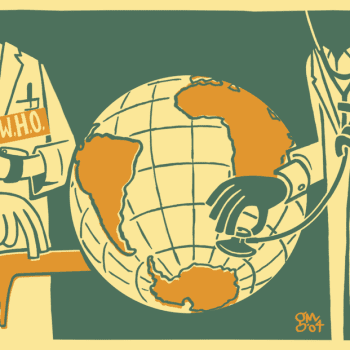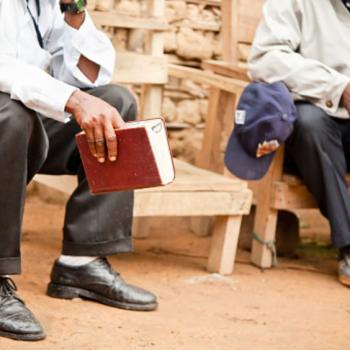Editor's Note: This article is part of an online symposium, "Does Seminary Have a Future?" hosted at Patheos this month. Read other perspectives here.
There have been a number of great posts regarding the future of seminary education recently on Patheos. Many insightful thoughts regarding what is working and what needs to be changed have been shared. In the spirit of that ongoing and important conversation, I thought I'd share some skills that might be worth teaching if my emerging community of faith is any indication of what the future of the church might look like.
Practicing Holistic Theology
Those famous works of systematics are worth reading, certainly. And thinking about God in thorough (and even linear) ways is a helpful exercise. But the task and scope of theology is often very limited and insular, reflecting only on itself. This is not the way we make sense of God in my faith community. Drawing on sources of literature, music, movies, art, popular culture and life experiences, we are constantly looking for connections and points of revelation. And we have never once halted conversation to say something is outside of the scope of systematics. Though my seminary gave me a great foundation by teaching me the breadth and scope of theological history and encouraged me to think critically, I'd love to see seminaries take this even further. I'd love to see a call for papers that span a variety of disciplines in creative ways. I'd love to see theology become more than just a brain exercise and instead something that incorporates the whole human being. Rather than separating theology from other disciplines and the rest of life, what would it look like to approach theology in a way that is truly holistic?
Discussion Facilitation
Every good Protestant knows that the preaching of the Word is the apex of the worship service. It takes the longest amount of time--to prepare as well as to present. Where I attended seminary, speech and preaching were required courses. I appreciate the value that was placed upon the practice of reading Scripture and liturgy well, and delivering a well-crafted sermon. However, as Pastor of a church in which discussion has become central to our life together, I faced a rather steep learning curve. In a recent conversation with Doug Pagitt, he mentioned a preaching conference he attended where participants argued that discussion is too difficult to facilitate. Pastors are afraid of facilitating a discussion because, unlike your five page double-spaced sermon, you cannot control where it goes. Doug's response? Yes, it is hard. It takes a lot of practice to get the hang of it. I wonder where seminary students could go to practice that for a number of years before pastoring a church?!
I can't help but agree with him. If seminaries can teach students to think critically about a Scripture text and then distill their thoughts into an essay, they certainly can teach them to create an outline that would enable students to facilitate a conversation.
I am not one to say that the sermon is dead. There are times during our communal life together when preaching has a rightful place. But discussion has a rightful place, too, and I'd love to see seminaries broaden their concept of the preaching/teaching task to reflect the collaborative and participatory world in which we now live.
Open Source Leadership
Frankly, I think seminaries should spend more time on leadership development in general. I know many a seminarian who was thrown into a leadership role with little more than his newly minted M.Div. title and was under the false assumption that it would be enough to make others care. That simply isn't the case. Organisms and organizations need leadership, and it's a skill that must be practiced and taught. New pastors face enough difficulties that cause them to question their abilities; their basic understanding of leadership shouldn't be one of them.
In a church that is more fluid and flat, traditional forms of leadership and hierarchy do little to describe or instruct a pastor in how to lead. Seminaries would do well to teach a wider array of leadership philosophies. More intuitive approaches heralded by people like Margaret Wheatley have been far more helpful to me personally, and in my estimation give the clearest picture of what leadership in the future church ought to resemble.
Team Collaboration
Sure, we've all had practice working in teams on projects and papers while in school. But guiding a team in the practice of ongoing collaboration is a bit different. I wonder if seminaries could find opportunities for students to take turns leading a worship planning team, guiding brainstorming sessions or collaborating on a special event. Rather than seeing collaboration as an often painful and annoying process that puts one's grade at risk, can seminaries approach team collaboration as something inherently meaningful to the task itself?
I highly valued my time at Princeton Seminary. In fact, I would have been happy to stay there in the ivory tower for the rest of my days. The rigorous and diverse academic courses gave me a broad horizon of understanding, and interaction with my fellow students, many of them international, helped me see God in new and fresh ways. I think seminaries are doing a lot of things right. But I'd love to see them take a few notes from the cultural creatives who seem to be at the furthest edge of innovation and make the seminary atmosphere a robust and generative environment for the church of the future.
11/16/2011 5:00:00 AM





